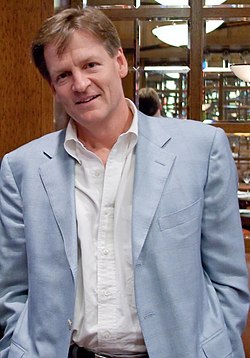Michael Lewis Quote
A credit default swap was confusing mainly because it wasn’t really a swap at all. It was an insurance policy, typically on a corporate bond, with semiannual premium payments and a fixed term. For instance, you might pay $200,000 a year to buy a ten-year credit default swap on $100 million in General Electric bonds. The most you could lose was $2 million: $200,000 a year for ten years. The most you could make was $100 million, if General Electric defaulted on its debt any time in the next ten years and bondholders recovered nothing. It was a zero-sum bet: If you made $100 million, the guy who had sold you the credit default swap lost $100 million. It was also an asymmetric bet, like laying down money on a number in roulette. The most you could lose were the chips you put on the table; but if your number came up you made thirty, forty, even fifty times your money.
A credit default swap was confusing mainly because it wasn’t really a swap at all. It was an insurance policy, typically on a corporate bond, with semiannual premium payments and a fixed term. For instance, you might pay $200,000 a year to buy a ten-year credit default swap on $100 million in General Electric bonds. The most you could lose was $2 million: $200,000 a year for ten years. The most you could make was $100 million, if General Electric defaulted on its debt any time in the next ten years and bondholders recovered nothing. It was a zero-sum bet: If you made $100 million, the guy who had sold you the credit default swap lost $100 million. It was also an asymmetric bet, like laying down money on a number in roulette. The most you could lose were the chips you put on the table; but if your number came up you made thirty, forty, even fifty times your money.
Related Quotes
About Michael Lewis
Lewis was born in New Orleans and attended Princeton University, from which he graduated with a degree in art history. After attending the London School of Economics, he began a career on Wall Street during the 1980s as a bond salesman at Salomon Brothers. The experience prompted him to write his first book, Liar's Poker (1989). Fourteen years later, Lewis wrote Moneyball: The Art of Winning an Unfair Game (2003), in which he investigated the success of the Oakland Athletics baseball team and their general manager Billy Beane. His 2006 book The Blind Side: Evolution of a Game was his first to be adapted into a film, The Blind Side (2009). In 2010, he released The Big Short: Inside the Doomsday Machine. The film adaptation of Moneyball was released in 2011, followed by The Big Short in 2015.
Lewis's books have won two Los Angeles Times Book Prizes and several have reached number one on The New York Times Best Seller list, including his most recent book, Going Infinite (2023).
